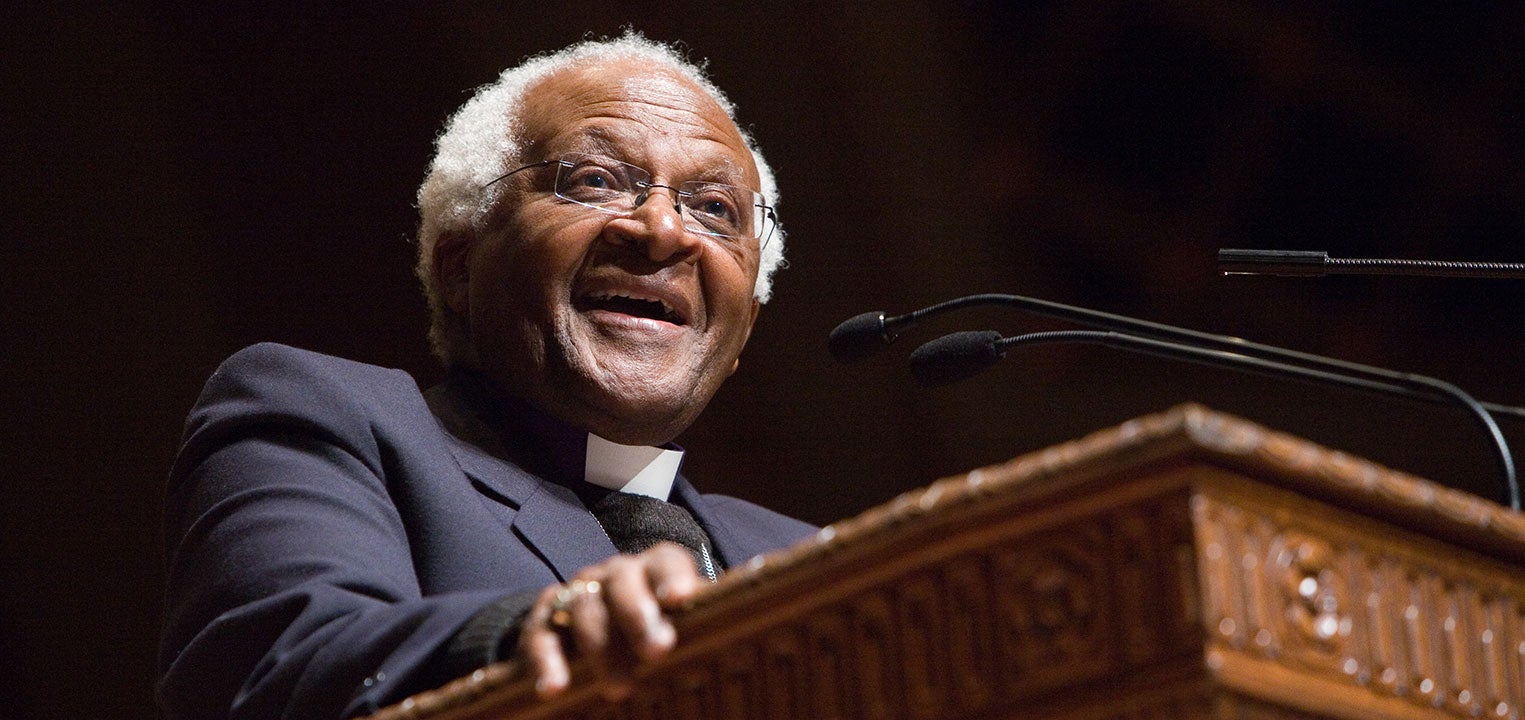The first black South African Anglican Archbishop of Cape Town, Archbishop Desmond Tutu rose to international fame during the 1980s as a deeply committed advocate of nonviolent resistance to apartheid. In 1995, Nelson Mandela asked Tutu to investigate atrocities committed on all sides during the apartheid years, appointing him chair of South Africa’s Truth and Reconciliation Commission.
Desmond Mpilo Tutu was born in Klerksdorp, South Africa on October 7,1931. His father was a schoolteacher, his mother a domestic worker.
After three years as a high school teacher, in 1958 he entered the Anglican ministry. He received his Licentiate in Theology in 1960 from St. Peter’s Theological College, Johannesburg, and was ordained to the priesthood in Johannesburg in 1961. Not long after his ordination, Tutu obtained his Bachelor of Divinity Honors and Master of Theology degrees from King’s College, University of London, England.
From 1967 to 1978 he served in a number of increasingly prominent positions, from lecturer at the Federal Theological Seminary at Alice, South Africa and chaplain at the University of Fort Hare; to lecturer in the Department of Theology at the University of Botswana, Lesotho and Swaziland; to an appointment as Associate Director of the Theological Education Fund of the World Council of Churches, in Kent, United Kingdom; to Dean of St. Mary’s Cathedral, Johannesburg; and finally Bishop of Lesotho.
By 1978, in the wake of the 1976 Soweto uprising, South Africa was in turmoil, and Bishop Tutu was persuaded to take up the post of General Secretary of the South African Council of Churches (SACC). It was in this position that he became both a national and international figure. Justice and reconciliation and an end to apartheid were the SACC’s priorities, and as General Secretary, Bishop Tutu pursued these goals with vigor and commitment. Under his guidance, the SACC became an important institution in South African spiritual and political life, challenging white society and the government and affording assistance to the victims of apartheid.
Inevitably, Bishop Tutu became heavily embroiled in controversy as he spoke out against the injustices of the apartheid system. For several years he was denied a passport to travel abroad. He became a prominent leader in the crusade for justice and racial conciliation in South Africa. In 1984 he received a Nobel Peace Prize in recognition of his extraordinary contributions to that cause. In 1985 he was elected Bishop of Johannesburg.
In 1986 Bishop Tutu was elevated to Archbishop of Cape Town, and in this capacity he did much to bridge the chasm between black and white Anglicans in South Africa. And as Archbishop, Tutu became a principal mediator and conciliator in the transition to democracy in South Africa.
In 1995 President Nelson Mandela appointed him Chairman of the Truth and Reconciliation Commission, a body set up to probe gross human rights violations that occurred under apartheid.
In 1996, shortly after his retirement from office as Archbishop of Cape Town, Tutu was granted the honorary title of Archbishop Emeritus.
Archbishop Tutu has held several distinguished academic and world leadership posts. He was elected Fellow of Kings College; President of the All Africa Conference of Churches, London; Chancellor of the University of the Western Cape, the William R. Cannon Professor of Theology at the Candler School of Theology, Emory University, Atlanta; Visiting Professor at the Episcopal Divinity School, Cambridge, Massachusetts; Visiting Scholar in Residence at the University of North Florida, Jacksonville; and Visiting Professor of Post-Conflict Studies at Kings College.
In recent years Tutu has turned his attention to a different cause: the campaign against HIV/AIDS. The Archbishop has made appearances around the globe to help raise awareness of the disease and its tragic consequences in human lives and suffering.
Archbishop Tutu holds honorary degrees from over one hundred and thirty universities, including Harvard, Oxford, Cambridge, Columbia, Yale, Emory, the Ruhr, Kent, Aberdeen, Sydney, Fribourg (Switzerland), Cape Town, Witwatersrand and the University of South Africa.
He has received many prizes and awards in addition to the Nobel Peace Prize, most notably the Order for Meritorious Service Award (Gold) presented by President Mandela; the Archbishop of Canterbury’s Award for Outstanding Service to the Anglican Communion; the Prix d’Athene (Onassis Foundation); the Family of Man Gold Medal Award; the Mexican Order of the Aztec Medal (Insignia Grade); the Martin Luther King Jr. Non-Violent Peace Prize; the Sydney Peace Prize and the Gandhi Peace Prize.
His writings include No Future Without Forgiveness and God Has a Dream.
Though his vigorous advocacy of social justice once rendered him a controversial figure, today Archbishop Tutu is regarded as an elder world statesman with a major role to play in reconciliation, and as a leading moral voice. He has become an icon of hope far beyond the Church and Southern Africa.

